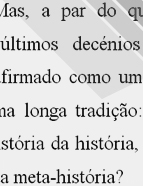

................................
Not by chance, the post-World War II years saw the emergence of new critical assessments of Portuguese historiography. One of these came from a young historian, Vitorino Magalhães Godinho, who subjected the instrumentalization of history by the Estado Novo’s traditionalism to rigorous critique. Godinho left for Paris in 1947, after a brief but highly significant tenure as a professor at the Faculty of Arts in Lisbon. In an article published in the Annales (1948), he identified two areas in which Portuguese historiography was particularly deficient: economic history and social history. This marked an important initial step (see also A crise da história e as suas novas directrizes [The Crisis of History and Its New Guidelines ], 1946, later included in Ensaios III [Essays III]) in establishing a rationalist, coherent, and global approach to historical theory and methodology, always considering history’s social function and echoing Herculano’s paradigm of the historian-citizen. A few years later (1955), in a detailed critical assessment, Godinho acknowledged “a rich tradition” of historical studies in Portugal, although he argued that research was undergoing a crisis—or was it perhaps more accurately a crisis of the Estado Novo regime? In any case, Godinho identified the obstacles at the root of this historiographical crisis, highlighting historians’ attitudes towards life, the lack of a “scientific environment,” the poor state of archives, deficient historical methodologies, and inadequate teaching of the discipline (" A historiografia portuguesa do século XX " [20th Century Portuguese Historiography], Ensaios III, 1971 [1955], p. 242).
The Estado Novo 's suppression of freedom significantly constrained historical writing. Thus, it is understandable that Godinho distinguished between “courtly and flattering historians” and “citizen historians” (a concept already advanced by Herculano in 1840 with reference to late medieval chroniclers). I n 1940–41, the regime established SNI History Prizes, awarded to Portuguese authors who supported the regime politically (such as Alfredo Pimenta and João Ameal), while the censorship banned António Sérgio’s innovative Introdução geográfico-sociológica à História de Portugal [Geographical and Sociological Introduction to the History of Portugal ] (1941), preventing him from pursuing a more ambitious project. Under the Estado Novo, the study of the contemporary era at universities—associated with politics and journalism—was stifled. In the 1940s, Magalhães Godinho was barred from writing a doctoral thesis on Oliveira Martins. It was not until the 1960s that some works on the 19th century began to receive encouragement at the Faculty of Arts in Coimbra (Silva Dias) and the Faculty of Arts in Lisbon (Jorge Borges de Macedo). Unlike in Spain, these studies were developed primarily outside the university framework by authors connected to opposition circles, influenced by the historiography of the Annales school or Marxism: Joel Serrão, Armando Castro, Victor de Sá, Augusto da Costa Dias, and José Tengarrinha, among others.
